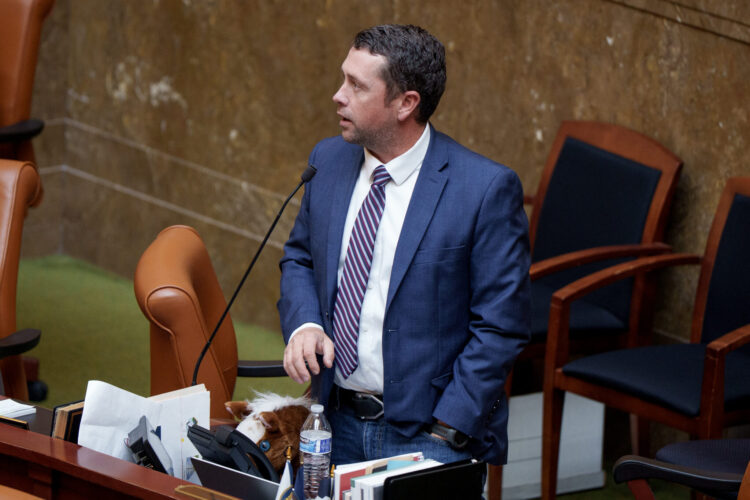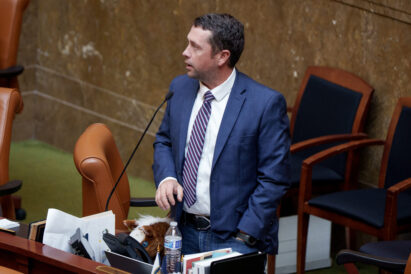‘Judicial incompetence’: Utah lawmaker runs bill to shield EMTs after Utah Supreme Court ruling

Photo by Spenser Heaps for Utah News Dispatch
Rep. Casey Snider, R-Paradise, speaks in the House Chamber during a special legislative session at the Capitol in Salt Lake City on Monday, Oct. 6, 2025.With some lawmakers again accusing the Utah Supreme Court of “legislating from the bench,” a legislative committee on Wednesday advanced a bill meant to fix a government immunity issue that its sponsor blamed on “judicial incompetence.”
In its last committee meeting before the Utah Legislature’s 2026 general session in January, the Government Operations Interim Committee voted unanimously to endorse a draft bill being sponsored by a member of House Republican leadership, House Majority Leader Casey Snider, R-Paradise.
Snider, who has worked as a firefighter, is running the bill meant to make clear in Utah law that government employees including first responders like firefighters and paramedics have broad government immunity from lawsuits while providing emergency medical services.
Snider said it’s been long understood that the state’s existing government immunity laws already widely protected first responders giving medical assistance — but he said the Utah Supreme Court turned that precedent on its head when earlier this year it issued a unanimous opinion in August remanding a lawsuit over a response to a 911 call, Armenta v. Unified Fire Authority, back to district court.
Snider and others supporting the bill — including attorneys for the Utah League of Cities and Towns and local fire chiefs — said that ruling now leaves paramedics, firefighters and other first responders vulnerable to “frivolous” lawsuits.
The Utah Supreme Court, “out of some sort of unanimous malfeasance, I would say,” Snider said, found that “somehow now Unified Fire and all firefighters and all EMTs and all paramedics in the state are now liable for damages as they pursue protecting our communities.”
“Let me be totally clear. Our Supreme Court has made our communities less safe,” Snider said.
Having worked as a firefighter and emergency medical technician for 15 years, Snider said he and other first responders now worry that, because of the Utah Supreme Court’s ruling, they have to “operate under the assumption that even if I do everything right I am still somehow liable.”
“Now that is in the back of the minds of every firefighter and every EMT in this state,” Snider said.
Jared Tingey, legal director for the Utah League of Cities and Towns, said the league “fully supports” Snider’s bill.
“We think the Supreme Court got it dead wrong and this fixes those changes,” he said.
Armenta v. Unified Fire Authority
The court case at the center of Snider’s bill and his complaints with the Utah Supreme Court was filed by a plaintiff named Jorge Armenta against the Unified Fire Authority, Utah’s largest fire agency that serves more than a dozen cities and unincorporated areas.
Armenta sued after medical technicians with Unified Fire Authority responded to a 911 call from his wife, who called dispatchers after Armenta experienced shortness of breath and chest pain. The first responders evaluated Armenta and told him his condition appeared normal, suggesting he had experienced a panic attack and that he didn’t need to go to the emergency room.
But a week later, Armenta was hospitalized for a “massive heart attack,” according to court documents. During surgery, doctors found a “100% blockage of Armenta’s right coronary artery,” the Utah Supreme Court opinion said, and Armenta believed that his injuries “will likely lead to heart failure and early death” unless he gets a heart transplant.
Armenta sued Unified Fire Authority for negligence, alleging the damage to his heart would have been avoided if the authority’s medical technicians had “properly and timely diagnosed and cared for him.”
Unified Fire asked the court to dismiss the case, arguing that Utah’s governmental immunity law protected it from being sued for giving Armenta emergency medical aid. The trial court agreed and dismissed the case.
Armenta appealed to the Utah Supreme Court, asking it to decide whether Utah’s governmental immunity law protected Unified Fire from being sued for providing Armenta emergency medical assistance.
In August, the Utah Supreme Court unanimously decided that the district court’s interpretation of “emergency medical assistance” was incorrect, having only looked at dictionary definitions of each word rather than looking at all of the words within the overall structure and context of the statute.
Using a Latin legal principle called “noscitur a sociis,” meaning “it is known from its associates,” the Utah Supreme Court determined that because the Legislature placed the term “emergency medical assistance” in a list with other activities like fighting fires and responding to natural disasters, the law says governments are protected when they provide “emergency medical assistance” during those types of listed emergencies.
The court also determined that the “constitutional avoidance principle” supported its conclusion, and that under that principle, the court presumed the Legislature did not intend for statutes to raise constitutional doubts. The court determined that if “emergency medical assistance” meant a response to a 911 call, that could raise questions about citizens’ access to open courts, which is a right guaranteed by the Utah Constitution.
The court ultimately agreed with Armenta and reversed his case’s previous dismissal, remanding it back to district court for further proceedings.
Snider and other lawmakers sitting on the Government Operations Interim Committee — including Sen. Brady Brammer, R-Pleasant Grove — argued the Utah Supreme Court should have simply relied on the historical public record to determine the Legislature’s intent when it first passed the government immunity law decades ago.
“Sometimes it’s not that complicated. It’s either clear in the language or it’s clear in the legislative intent, and it’s written in the legislative intent,” Brammer said.
He argued the court did “mental gymnastics” to arrive at its conclusion. “I don’t know how they got here. It’s bizarre to me,” he said. “I’d love to ask them about it.”
Brammer — who has been critical of the state’s judiciary in the past — also said he’s concerned that “this was missed by five justices and they opined on it unanimously.”
“That’s a big red flag on our Supreme Court,” Brammer said, “and whether they’re actually interpreting statute or just starting out with lip service and then doing what they want.”
Another lawmaker, Rep. Matt MacPherson, R-West Valley City, raised concerns about what would happen without Snider’s bill and if lawmakers let the Utah Supreme Court’s interpretation stand. He worried that it could not only create a chilling effect on emergency responders in their day-to-day work, but also lead to increased costs to local governments and taxpayers.
No Democrats sitting on the committee voiced any opposition to Snider’s bill and they all voted along with Republicans to endorse it for the 2026 legislative session, teeing it up for quicker consideration through the legislative process when lawmakers convene Jan. 20.
Ongoing feud with the judiciary
Snider’s bill comes amid Utah lawmakers’ ongoing feud with the state’s judicial branch. It addresses another ruling multiple Republican lawmakers have disagreed with, criticizing the court’s interpretation of the law and arguing that the Utah Supreme Court’s five justices are ignoring “plain language” in Utah law or the Utah Constitution and are instead creatively misinterpreting it.
In recent months, conservative legislators have been outraged by a series of court rulings, most recently in the state’s yearslong redistricting legal battle. Last week, 3rd District Judge Dianna Gibson sided with the plaintiffs in that lawsuit, rejecting a congressional map submitted by the GOP-controlled Utah Legislature and instead picking an alternative map drawn by the plaintiffs that creates a Democratic-leaning congressional district in northern Salt Lake County.
At least one Republican legislator, Rep. Matt MacPherson, has said he plans to pursue articles of impeachment against Gibson, alleging she ignored a provision in the Utah Constitution that says that the Legislature “shall” redistrict.
However, Gibson’s ruling was largely based on a previous, unanimous Utah Supreme Court decision last year that remanded the case back to her courtroom. That ruling made clear that the Utah Legislature’s powers have limits when it comes to altering or repealing “government reform” ballot initiatives.
Utah’s redistricting court case largely revolves around Proposition 4, a ballot initiative narrowly passed by Utah voters in 2018, which established an independent redistricting process meant to guard against gerrymandering.
Based on the Utah Supreme Court’s ruling, Gibson in August ruled that the Legislature overstepped when it turned Proposition 4’s independent redistricting commission into an advisory body that lawmakers could ultimately ignore.
She also ordered a “remedial” court process to pick a new map to replace the 2021 congressional map she voided as the result of an unconstitutional process. When Gibson picked one of the plaintiffs’ maps, she ruled the Utah Legislature’s preferred map failed to adhere to Proposition 4 to the greatest extent practicable.
Since Gibson’s ruling — which legislative attorneys have said they intend to appeal back to the Utah Supreme Court and the U.S. Supreme Court if necessary — Utah’s Republican legislators and the Utah Republican Party have been accusing Gibson of “judicial activism” and violating the separation of powers between the legislative and judicial branches.
Some have also questioned whether her actions could amount to “malfeasance,” which under Utah law is an impeachable offense.
The political rhetoric has become increasingly heated. Earlier this week the Utah judiciary issued a rare statement saying Gibson has received violent threats. That statement also urged Utahns to respect existing avenues to appeal judges’ rulings and encouraged support of the institution and its public servants.
“Utah’s courts provide a structured and transparent system for reviewing decisions and correcting potential errors, reinforcing public confidence in the integrity of the judicial process,” the judiciary said. “We encourage all Utahns to stand with the Judiciary in protecting the safety of our judges and employees and protecting the fair and impartial administration of justice.”
Utah News Dispatch is part of States Newsroom, the nation’s largest state-focused nonprofit news organization.



